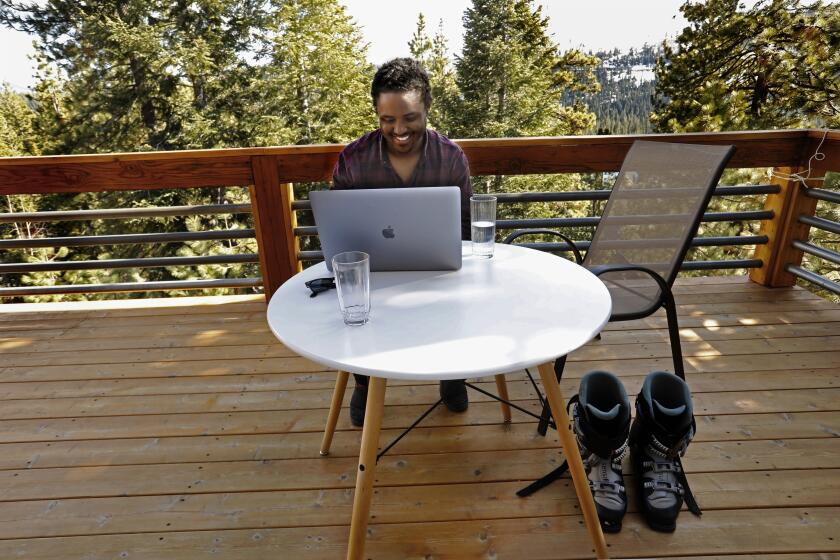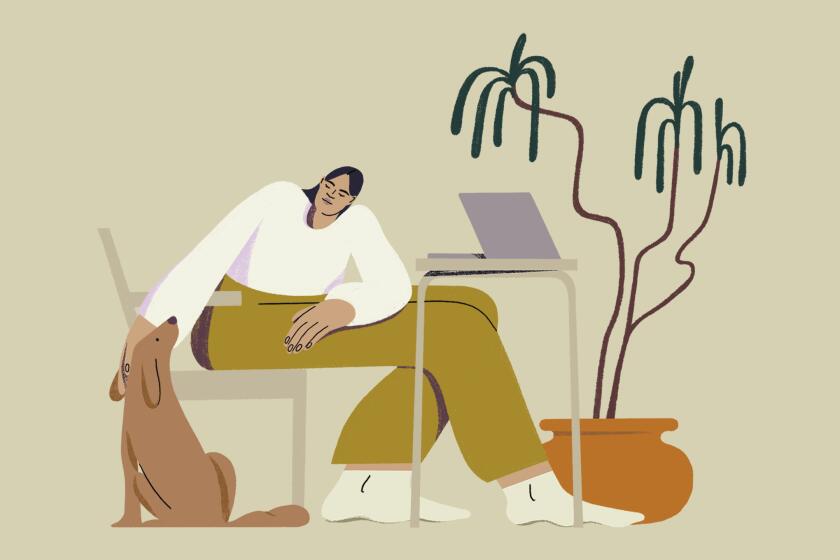Op-Ed: Of course many people of color prefer remote work. It helps dodge office weirdness

- Share via
Let’s suppose for a second that offices, microcosms of the real world, have always been less-than-neutral spaces for people of color. Spaces that, over the course of time, could sometimes feel like living too close to radiation. Which is to say, sooner or later it was going to exact a toll.
But in 2019 we started to see some interesting movement. According to the U.S. Bureau of Labor Statistics, about 6% of employed people before the COVID-19 pandemic worked primarily from home: 26% of those were white people, 18% were African Americans and 13% were Latinos. By May 2020, 48.7 million people, about 35% of the employed workforce, reported that they had worked from home in the prior four weeks because of COVID-19.
I was one of the new remote workers, and the experience revealed an unexpected and until now unvoiced joy: Working, free from daily office interactions, let the focus stay on work. Absent any other interpersonal weirdness.
The pandemic disruption is crystallizing priorities for employees and employers alike.
My first formative personal experience with remote work took place long before the pandemic. I was working on several projects for a major international advertising firm, punching up the tone and approach of a global ad campaign for a large telecom company. The copywriting job entailed months of phone meetings and emails. It went well. What I had written made the telecom folks forget for a second that they were telecom folks and made them feel instead like rock and roll. So, a win all around — and ultimately, I was invited to a meeting with the CEO to talk about next steps and future projects.
When he walked into the conference room, though, he was … surprised. Visibly. A contact there later confided to me: The CEO hadn’t expected me to be Black. He told her my race made no difference. I also never worked for that firm again. Its call. Not mine. I suspect that it was the irreducibility of my physical presence — the up-close reminder of my race — that lost me the job.
But during the pandemic, when working at home became the default, physical presence stopped being a factor. In November 2021, I got hired as an assistant vice president at a marketing firm. Six months earlier I had left a senior staff editing job at a digital news and entertainment media platform called Ozy Media, where the worst boss I ever had — also an African American man — crashed the company, triggering a welter of lawsuits and federal fraud investigations.
I had imagined I was professionally toxic by association. During the interview process and in Zoom call after Zoom call, my soon-to-be new colleagues reassured me this was not so. They told me “a guy like me” needed to be in a place where I was, dare we use the word, loved?
This is always a good, if rare, sensation — but it hints at something more fundamental. There had been change. Telework came to the rescue. In real life I am 6-foot-1 and 220 pounds. On a Zoom call, I am about an inch tall and just as wide across. Physicality: gone. Beyond that, I imagine virtual work negated many of the other, unspoken barriers associated with cultural bias, too. What I’d call the “othering factor.”
Is this what a meritocratic work experience feels like?
I asked around. Sherman Wellons, the African American owner of Inertiart Studio, an animation shop in Los Angeles, told me — over Zoom — that his primary reason for preferring to work from home is that he is more productive. His secondary reason? Working online frees him. That is, not having to be in the office where his presence cannot be reduced, is just easier.
Projecting the right image for remote work is easily managed with props, he said. First, off comes his beanie, he told me, and he waved at the Black Panther pajama top he was wearing. “Yeah. I’d swap this for a shirt,” he said and smiled. And for the piece de resistance, he added a pair of horn-rimmed glasses. Non-prescription, Clark Kent-style.
Then he waved. A flourish and a “Ta-da!”
“This is my ‘make-people-comfortable outfit,’ ” Wellons said.
Face-to-face encounters in offices always hammered home the immutable reality that the marketing industry, according to a 2020 Marketing Week survey, is 88% white and just 2% Black. Wellons always had the feeling that his physical presence was something to which his mostly white colleagues had to “adjust.”
Online, with a bit of dress up, he had more control of the adjusting.
Love remote work? Here are expert tips for how to negotiate a permanent work-from-anywhere arrangement with your boss.
Shanda Wilson, a 41-year-old African American founder and CEO of a Washington, D.C.-based digital services firm called INSHIFT, said she prefers remote work for similar reasons. Online she’s more productive. And she’s an introvert, for whom “the office may not be really helpful,” she told me. “For lots of different reasons. With remote work I’ve seen some people really soar though.”
What type of people?
“People,” she said.
While I’m sure she means “people” in general, it’s also a nicety. I’m also sure she means “people” who look like she does; like I do. “People” who could spend their whole workday in high tech and the only Black face they see is in a mirror.
“People,” who, in a November survey of 10,737 knowledge workers conducted by the workplace research consortium Future Forum, indicated they preferred remote work over office work.
“In the U.S., 86% of Hispanic/Latinx knowledge workers and 81% of Asian/Asian American and Black knowledge workers would prefer a hybrid or fully remote arrangement, as compared to 75% of white knowledge workers,” the survey found. Future Forum also reported that between May and November 2021, the sense of belonging at work increased 24% for Black respondents and 32% for Hispanic/Latinx respondents, compared with 5% for white respondents.
Since white male knowledge workers are most likely to be present in offices today, and less likely to work virtually, the poll also evokes the double-edged nature of remote work. Working from home helps people of color avoid certain pitfalls, but it also excludes them from proximity’s benefits.
With some of us now returning to office work by choice, physicality — and its disparities — are things we are still dealing with, directly or indirectly.
Here’s hoping for more meritocratic American workplaces. Until then? I’ll catch you on Zoom.
Eugene S. Robinson is a writer and assistant vice president of marketing content at WongDoody, a marketing firm. This article was produced in partnership with Zócalo Public Square.
More to Read
A cure for the common opinion
Get thought-provoking perspectives with our weekly newsletter.
You may occasionally receive promotional content from the Los Angeles Times.












